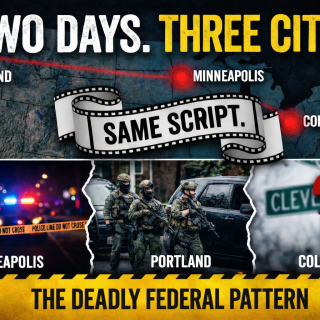Advertisement
Part Two
(Anti-)Zoning (Anti-)Enforcement, under the auspices of City Attorney and City Council, forms one leg of the evil, broken triangle, the misnamed Division of Public (aka Private) Service is the second.
Led by Jennifer Gallagher, an engineer not an administrator by background, the Division is devoted to private interests not the public. Gallagher herself, who responds to no communications from the public, is under longtime investigation by the Ohio Ethics Commission for awarding contracts for the controversial controversial Little Turtle redevelopment to her husband’s construction business. Even by Andy Ginther’s thin statement of ethics, Gallagher should resigned or been immediately removed from office following those revelations. (See my “J’accuse: The City of Columbus Division of Public (aka Private) Service,” Busting Myths, Columbus Free Press, Mar. 3, 2023 https://columbusfreepress.com/article/busting-myths-j%E2%80%99accuse-city-columbus-division-public-aka-private-service )
Private Service, as I call them, leads the City in relentlessly favoring all private interests including out-of-state and non-US-based corporations. They are well rewarded by their private contractors. That is clear.
Given their acceptance of widely publicized ethical and legal violations by the Division, I have no doubt that the mayor and City Council are also beneficiaries. Not only is Andy Gallagher’s supporter and pal, but chief of staff Michael Brown or Mb ordered City Councilors and aides not to respond to my inquires after he lied to me about bringing my documented complaints to Council’s attention. He did not. Shannon Harden and Andy G. don’t care.
I summarize Private Service’s sins and often crimes of commission and omission with respect to their role in the evil, broken triangle with my focus on neighborhoods and the lives of residents.
First, among their most significant responsibilities is the inspection of streets and sidewalks, and oversight of their repair. A brief walk, bike or scooter ride, or drive around the city immediately reveals their consistent neglect and the often-deadly consequences of one of their primary duties.
It is also impossible to get their attention. When I succeeded once or twice, it took up to a full year for them to begin action on a few feet or yards of severely broken sidewalks. One inspector informed me that a sizable pothole in the street was “not serious enough” to repair; that is, compared to many other problems.
Is it any surprise that almost all visitors to Columbus immediately comment on the condition of streets and sidewalks? But there is no profit in maintaining a safe, attractive city, or repairing a broken one to Jennifer Gallagher’s private business model. Andy and Council know but don’t care. They plan for better roads for private developers not ordinary residents. To whom will they award contracts? Follow the money.
What does Private Service do instead of their legal assignments? To begin, they leaflet private vehicles about street cleaning days. These cars are parked within a few feet of posted signs. Such leafletting is illegal. UD students toss them to the ground. When I complained, Private Service first lied about it, then admitted their crime. Even they could not ignore the physical evidence. But they do not remove now defunct “Adopt a Neighborhood” or “Michael Coleman, Mayor” signs as requested, nor fake, made up “historical district” signs often placed within sidewalk walking space despite repeated 311 requests. Private Service violates the urban environment.
More seriously, without bringing the issue to the attention of City Council, CPD, or the public, Private Services sold parking rights on residential city streets that had already been sold to residents for permit parking a second time to Eastern European based short-term car lease companies. This is illegal double dealing and a violation of the rights of residents who paid for permit parking.
CPD did not know what to do. When I questioned Private Services, they repeated over and over, “we are enhancing mobility.” But they were breaking the law and actively obstructing mobility.
They repeated this same contradictory and destructive action first by replacing permit parking permits long signified by stickers clearly visible on vehicles with apps. Not only are the apps difficult and sometimes impossible to use, neither police nor neighbors are able to tell if a vehicle owner has paid for parking. CPD officers in the field, to use their own word, “hate” this. They were not consulted. Of course, private, out-of-town contractors pay the pipers of Private Service.
Private Service next turned to damaging parking more generally with a shift from meters to apps and kiosks that are often some distance from parking spaces and do not always operate properly. Instructions are never clear. The number of spaces for seniors was reduced. The apps are exceedingly cumbersome to use, all generations of drivers agree.
Moreover, almost no private parking lots, especially in failing downtown, accept the City’s own parking app. But the bottom line, as always, prevails. Private Service profits through out-of-town private companies selling their low-quality wares.
Private Service defended this set of corrupt and destructive actions by claiming that removing parking meters—historical badges of cities—improved the visual environment. That is pure bullshit, to use the most appropriate technical term.
But the worst is the plague of electric scooters in which Columbus is unique nationally. (see my “The plague of Columbus’ streets and sidewalks: Electric scooters illegally fueled by the City’s Division of Public (aka Private) Services,” Busting Myths, Columbus Free Press, Apr. 14, 2023 https://columbusfreepress.com/article/busting-myths-plague-columbus%E2%80%99-streets-and-sidewalks-electric-scooters-illegally-fueled-city )
I first raised the question of out-of-control unregulated rental scooters with City Council almost three years ago. Three legislature aides—none of them working for the City now—assured me that regulation was coming soon. I personally provided them with information on the policies in other large cities in the U.S. and abroad. This was a hot issue in 2021.
Since that time, Columbus has regressed. Unlike all its peer and larger U.S. cities, it has no regulation. Private Service sold the rights for corporate-owned rental scooters to fill the city’s sidewalks in direct violation of the purposefully confusing wording of the relevant city law: scooters can be left on sidewalks as long as they do not interfere with movement. That is a logical and a physical contradiction in terms. It is no doubt purposeful.
OSU has followed the City in accepting private payment to allow scooters to be used illegally on sidewalks and left everywhere on campus to obstruct human movement. Campus officers tell me that they are given no instructions whatsoever about responding to the proliferation of often dangerously driven scooters. Unlike most other universities, there are no warning signs, and almost no designated areas to leave the scooters.
Across the city and especially in the University District and the declining but privileged Short North, scooters interfere with all other forms of human movement on sidewalks and streets. Very often, two drunken young people ride wildly without helmets on one small vehicle. Uber, GrubHub, and other delivery services hire young people with huge containers strapped to their backs to make deliveries on scooters. Accidents of varying severity are common. Reports of major injuries are common but seldom publicized adequately.
Only in the Short North are renters supposed to locate their scooters in designated places. That is the same power of purse that leads to unenforced curfews and discrimination against food truck workers.
Of course, the scooter regulation is seldom enforced. CPD is very consistent in enforcing no laws systematically. Riding scooters and bicycles on sidewalks, however dangerous to pedestrians, is ignored.
CPD officers regularly tell me “We hate them.” They are not instructed in what to do with scooters in movement or abandoned illegally. They know their dangers better than most of us. Many express frustrations with the contradictions of the law and their limited ability to respond. Of course, they are not consulted. No one knows why scooters are not rented and returned to locked stations like electric bicycles. That would make too much sense for Private Service.
I attempted to report abandoned scooters to the failing 311 system. At first, they attempted to tell me—one private citizen—to contact the four out-of-town rental companies directly: Lime, Lyft, Link, Spin (clever, eh?). I informed 311 that that is their official responsibility. The only time that my urgent request was fulfilled for scooters to be picked up quickly was the day after drunken student tenant neighbors dumped seven scooters and one electric bike in front of my garage door, trespassing on private property in the process. CPD reluctantly photographed the crime scene and filed a report.
Private Service, Zoning (Anti-)Enforcement, CPD administrators, Andy G., and City Council do not care. They are all complicit in the public for private profit decaying state of the City and city.
I did experience a potentially positive surprise during the week of July 17. After reporting lines of abandoned Lime scooters daily on East Frambes Ave., I called out to a Lime contractor’s truck one morning. He stopped. I asked him to pick up the illegal scooters clearly visible in front of him. He responded by jumping out of his truck, swearing at me uncontrollably and incoherently, and advancing toward me. I ordered him to stop. He ran back to his pickup and sped away, leaving all the scooters on the sidewalk.
That is intolerable and illegal. I am a 74 year old retired university professor. I laboriously contacted Lime who apologized, asked me for as much information as possible about the driver and vehicle, and promised more surveillance in my neighborhood. I then spoke with a local employee who also apologized and told me that they were actively working on the problems.
In our conversation, it emerged quickly that Private Service did not brief Lime, and presumably the other rental companies on City codes. Similarly, individuals who rent scooters via their apps are not provided with instructions on where they may and may not leave them.
This is a colossal assault on the safety and rights of everyone in Columbus. How can the head of Private Service and the legally responsible member of City Council and the man who calls himself mayor but takes no responsibility for anything accept this? How much are they getting paid under and over the table? That is The Columbus Way of destroying a city and failing its publics.
As with having a mid-nineteenth century unreformed, undemocratically elected, unrepresentative city council, failing to regulate scooters is a mark of Columbus’ exceptionality, along with having no documented history and no identity. Every other aspirational city has regulations which are generally enforced. I witnessed this myself on a recent trip to Pittsburgh, Bethlehem, and Philadelphia. We were on as many as 10 campuses, large and small, public and private. None—not one—had a scooter problem.
Once among the most corrupt cities in the U.S., Pittsburgh and Philadelphia have transformed in large part. Columbus now holds that title with little significant competition.
The third leg of the broken, evil triangle—in stark contrast to Pittsburgh’s only slightly tarnished Golden Triangle where the Ohio River forms—is 311, Columbus’ much touted but all but useless public joke of a reporting system. Unlike peer cities where problems may be reported 24/7, 311 has just expanded to 7 am-7 pm, from 8 to 5, five days/week. Problems arising after 7 pm on Friday carry no significance, although much of Monday and Tuesday is spent dealing with the weekend backlog. On OSU football weekends, this is a major failing.
311 does nothing more than distribute reports—sometimes accurately, often not—to the City departments that telephone and online operators guess might be the correct destinations. In my experience, they often guess incorrectly and/or muddle the distribution and contents of information. Sometimes, 311 confirms receipt of reports; often they do not. Residents live in a realm of guessing.
Once 311 forwards a complaint, that is the end of their work. There is no follow up. There are no checks and balances. There is no responsibility at any level. That is unmistakably the Columbus Way.
The system of checking “individual accounts” for reports is often inoperable. I ask for all responses to be sent to me by direct email, with specific complaint, address or location, action taken, and rationale for that decision all provided. I never received all the information that I regularly request. Often what I receive ranges from incomplete to incomprehensible to nonsensical and contradictory. No one cares.
Both Zoning (Anti-)Enforcement and Private Service reject almost all of my reported legal offenses. They will not tell me on what grounds. Until I have evidence to the contrary, I am forced to conclude that they have no justification.
Another evil triangle: they are following orders; they do not know the laws they are paid to enforce; and they are either physically or intellectually unable to see clearly visible offenses from the sidewalk or from their City vehicles idling at the curbside polluting the hazy skies of the city.
On July 19, I informed 311 that I would no longer make reports to them. It is a complete, and frustrating, waste of time. I directly requested them to stop emailing me. But the messages denying my complaints with no specific content keep coming, like spam from the City. There were at least eight today alone (July 21).
On July 21, I filed a complaint against 311 with 311 itself. The spamming continued. I have sent a “Cease and Desist” request.
Will they respond to that? I wager: No. Any takers?
------------------------------
Harvey J. Graff is Professor Emeritus of English and History at The Ohio State University and inaugural Ohio Eminent Scholar in Literacy Studies. Author of many books, most recently he published Searching for Literacy: The Social and Intellectual Origins of Literacy Studies. My Life with Literacy: The Continuing Education of a Historian. The Intersections of the Personal, the Political, the Academic, and Place is forthcoming. “Reconstructing the new ‘uni-versity’ from the ashes of the ‘multi- and mega-versity’” is in progress.



